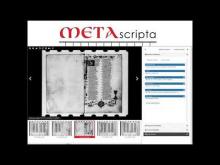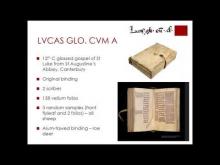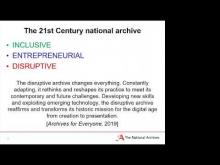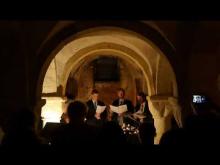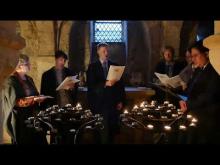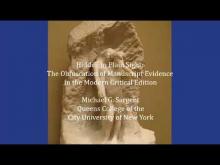Dark Archives (Oxford, 2019)
THE DARKNESS OF THE MEDIEVAL ARCHIVES, the shadows of the library stacks: too vast for countless lifetimes of scholarship to exhaust? And yet, in our internet era, the accelerating machine-processing of centuries of collected medieval materials and data is yielding ever more detailed, extensive maps of the archive’s extent and features. The goal of completely surveying the archive, down to every folio and character, is not only increasingly viable but irresistible – and at a time when competence in its languages, diplomatics and palaeography is contracting; for this same process promises new revelations, of unprecedented richness and detail, about the medieval world itself.
Yet the great irony is that on our new map, the Dark Archives, the medieval unread and unreadable, dwarf all that we currently know, and indeed threaten to paralyse fresh research. In quantity, they encompass the great majority of the millions of known folios and associated records, that remain unread, unscanned and scattered across the world. Who will fund their expensive digitization? What should be prioritized? And to what end, when the mass-transcription and record-creation technologies needed to explore them remain unequal to the task? Most challenging of all may be owning the shift in perspective that the Dark Archives are forcing upon us: the unsustainably small extent of what we term ‘the medieval’, and the uncertainty over what might succeed it.
Join us this September to crystallize and advance the field at Dark Archives, which is bringing together over 50 of its likely academic and commercial key-holders, from archivists and intellectual historians to machine-learning researchers. General registration now open, and full programme published:
Day 1 (10th September): Mapping the Medieval Graphosphere: What Dimensions, How Composed, Whether Habitable?
Day 2 (11th September): Endless Deserts, Oceans and Mountains: Tackling the Metadata Crisis
Day 3 (12th September): Re-Making Medieval History
along with a range of practical workshops on the latest techniques for Dark Archives discovery on 13th September.
8:30-9:00am Coffee and Registration
Chair/Respondent:
- Nigel Palmer
- Teresa Webber
- Eltjo Buringh
- Utrecht University
Keynote Address: Estimates of Manuscript Numbers
- Jo Story
- University of Leicester
Insular Manuscripts: how many and what next?
- Joanna Tucker
- University of Glasgow
Survival and loss: working with documents from medieval Scotland
- Ralph Cleminson
- University of Oxford
Non leguntur: shedding light on Slavonic sources
- Adrien Quéret-Podesta
- Petőfi Sándor School
"Textual ghosts" in the oldest Central European historiography
Coffee
- Krista Murchison
- Leiden University
(Re)collecting the Archive: Recovering Medieval Manuscripts Destroyed During WWII
- Gustavo Fernández Riva
- FAU Erlangen-Nürnberg
- Time Machine Organization
Network Analysis of Manuscripts
Questions
1.00pm to 2pm Lunch
Chair/Respondent:
- Graham Barrett
- Ellie Pridgeon
- University of Leicester
The Writing on the Wall: Medieval Painted Inscriptions
- Maria do Rosário Morujão
- University of Coimbra
Dark Seals in Portuguese Archives
- John Hines
- Cardiff University
Dark Sides of the Runes
- David King
- University of East Anglia
The Corpus Vitrearum Medii Aevi
Questions
Coffee
Chair/Respondent:
- Anthony Lappin
- Anastasia Shapovalova
- Institut de recherche et d'histoire des textes, Paris
Exploring the Medieval Archives in France
- Monika Opalinska
- University of Warsaw
Reconstructing medieval English religious culture: forgotten manuscript sources versus digital media
Questions
- Will Noel
- Schoenberg Institute for Manuscript Studies
Keynote Address: Through a screen darkly: the metadata crisis and the authority of the digital image
Chair/Respondent:
- Eltjo Buringh
- Verónica Romero
- Universidad Politecnica, Valencia
Interactive-Predictive Transcription and Probabilistic Text Indexing for Handwritten Image Collections
- Achim Rabus
- University of Freiburg
Training generic models for handwritten text recognition using Transkribus: Opportunities and Pitfalls
- Vincent Christlein
- Friedrich-Alexander University
Scribal identification and document classification
11.10am to 11.25am Coffee
- Ben Kiessling
- University of Leipzig
The Limits to Digitization
- Roger Louis Martinez-Davila
- University of Colorado
Massive Open Online Projects to teach palaeographic skills and to prepare manuscript transcriptions
Thought-Game - Build a Universal Manuscript Transcription Platform - Now !
Participants joining the chair & panelists:
12.45pm to 1.55pm Lunch
Chair/Respondent:
- Jo Story
- Toby Burrows
- Oxford E-Research Centre
Aggregating provenance metadata to reveal the histories of medieval manuscripts
- Andrew Hankinson
- Bodleian Library
- International Image Interoperability Framework
Discovery through Data: How IIIF shines a light into the dark archive’
3.20pm to 3.30pm Coffee
- John McEwan
- St Louis University
Reflectance Transformation Imaging and Medieval Seals
Thought-Game: Devise a metadata system to satisfactorily describe and relate all written medieval materials - Now!
Participants joining the chair & panelists:
4.50pm to 5pm Coffee
Chair/Respondent:
- Suzanne Paul
- Carolin Schreiber
- München, Bayerische Staatsbibliothek
Keynote Address: Bringing the Dark Archives to the Light – Medieval Manuscripts in German Collections in the Digital Age
- Paul Dryburgh
- The National Archives, Kew
Peering into an impenetrable gloom and the “tyranny” of digital by design: the future of medieval collections at The National Archives (UK)?
Questions
Chair/Respondent:
- Pip Willcox
- Luca Polidoro
- University of Florence
The Secrets of the Barberini
- Laura Light
Manuscripts in Private Hands
- James Louis Smith
- Trinity College Dublin
Pre-Modern Manuscripts and Early Books in Conflict Zones: An Emerging Network and its Goals
- Christopher Wright
- Matteo di Franco
- University of Cambridge
From isolation to integration: making Greek manuscripts readable
- Dot Porter
- Schoenberg Institute for Manuscript Studies
Reading Across A Digitized Collection of Books of Hours
Coffee
Roundtable
Participants joining the chair & panelists:
12.10pm to 1pm Lunch
Chair/Respondent:
- Daron Burrows
- Michael G. Sargent
- City University of New York
Hidden in Plain Sight: The Obfuscation of Manuscript Evidence
- Kyle Ann Huskin
- University of Rochester
Shedding Light on Dark Archives: Principles for Editing Recovered Texts
- Andrew Dunning
- University of Cambridge
Opening medieval books and fragments to students with documentary editing
- Elizabeth Solopova
- University of Oxford
An Invisible Giant: Editing Neglected Canonical Texts
Questions
Coffee
Chair/Respondent:
- Roger Louis Martinez-Davila
- Mark Faulkner
- Trinity College Dublin
'Big Dating' and 'Bottom-up periodisation'
- Sarah Savant
- Aga Khan University
Finding Meaning in 1.5 Billion Words of Arabic: The KITAB Project and Its Aims
- Julia Craig-McFeely
- University of Oxford
‘How dark is my archive?’: What lies behind and beyond the face of Musicology’s online archive, DIAMM
Questions
Coffee
Chair/Respondent:
- Richard Ovenden
- Marc Polonsky
- The Polonsky Foundation
Digitisation of cultural heritage: a funder's perspective
- Maja Kominko
The Arcadia Fund
- Luciano Floridi
- University of Oxford
Keynote Address: Semantic Capital. Its Nature and Value
Concluding Debate
- Verónica Romero
- Universidad Politecnica, Valencia
Hands-on Workshop on Assistive Technologies to Access the Contents of Handwritten Text Manuscripts
12pm to 1pm Lunch
- Roger Louis Martinez-Davila
- University of Colorado
Crowdsourcing Manuscript Transcriptions: Opportunities and Challenges using MOOCs, Social Media, and Emerging Platforms
- Alexander Zawacki
- Helen Davies
- University of Rochester
Multispectral Imaging: Technologies, Techniques, and Teaching
